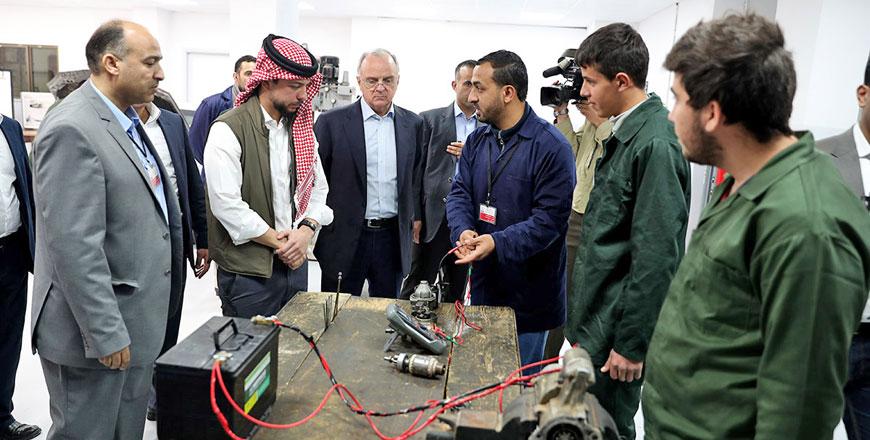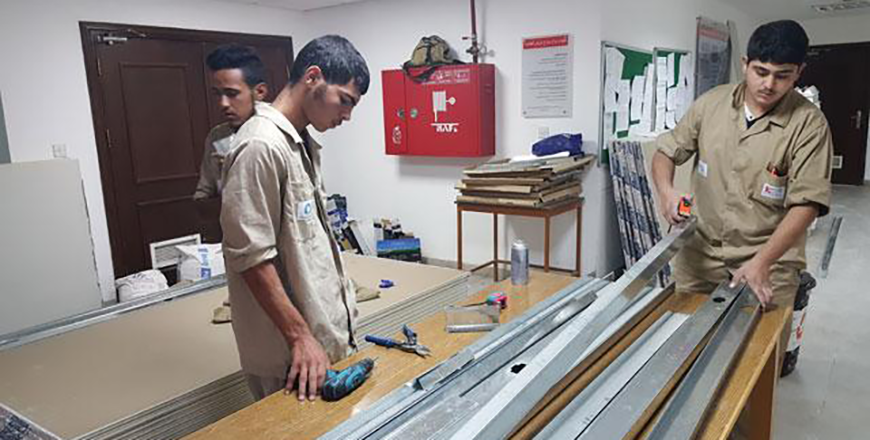You are here
Crown Prince listens to success stories of vocational centre trainees
By Rana Husseini - Mar 07,2019 - Last updated at Mar 07,2019

HRH Crown Prince Hussein visits the Naour Vocational Training Institute in Amman on Thursday (Photo courtesy of Royal Court)
AMMAN — HRH Crown Prince Hussein on Thursday paid a visit to the Naour Vocational Training Institute (NVTI) in Amman to check on the services provided to the trainees and listen to their success stories.
The Crown Prince stressed during his meeting with the students the importance of vocational and special training, “which will help them join in the labour market”.
Crown Prince Hussein then toured the vicinity and checked on the vocational training halls and equipment that included workshops for construction, cosmetology, auto mechanics and air-conditioning technologies.
The NVTI, which is affiliated to the Vocational Training Corporation (VTC), succeeded in helping 760 men and women graduate from the facility that was established in 2012.
VTC Director Raed Hammad said there are 44 vocational training centres spread across the Kingdom.
“We receive both men and women trainees regardless of the level of their training, as long as they finish 10th grade and are 16 years old or above,” Hammad told reporters.
Hammad added that around 10,000 trainees are enrolled in the VTC’s vocational training centres and the figure jumps occasionally to over 20,000 “because of the increase in demand for vocational training among the youth”.
“We try to cater our training to the market’s needs in order to combat poverty and unemployment among the youth,” Hammad added.
Since the establishment of the VCT in 1967, Hammad said, around 400,000 trainees have graduated, “of whom 30 per cent were women”.
Meanwhile, Director General of the VTC Hani Khleifat said that the aim is also “to ensure that our trainees are successful in finding jobs in the private sector or in opening their own businesses”.
“Most of the job opportunities for fresh graduates are in the health and education sectors, so we try to focus on other professions by ensuring a good quality of training,” Khleifat told reporters.
At the same time, Khleifat added, the VTC focuses on the trainers by ensuring that they enrol in the best training courses in Jordan and abroad.
“We also focus on encouraging women to enrol in our courses because we believe in gender equality and realise that women’s participation in the labour market, which stands at around 14 per cent, is very low,” Khleifat added.
Some of the training courses focus on gypsum board instalments and drywall building systems, according to Khleifat.
“We realise that Jordan suffers from water shortage and that is why we are focusing on using new methods in building and construction that are dry and do not require the use of a lot of water,” Khleifat explained.
The NVTI is partially supported by the German company Knauf, which provides the gypsum board.
“The German company, which was established in 1930, has branches in 80 countries with 160 factories,” Hani Qurneh, the regional manager of Knauf, said.
“The company aims is to contribute to developing the communities of this region, and Jordan is one of our priorities. That is why we established a training centre in 2014,” Qurneh told reporters.
Also on Thursday, Crown Prince Hussein paid a surprise visit to the Ministry of Labour’s Amman first district employment directorate and was briefed on the procedures of receiving jobseeker applications, a Royal Court statement said.
The Crown Prince spoke to a number of young men and women during the visit, and directed the relevant staff at the Ministry of Labour to provide them with the needed facilitations.
Crown Prince Hussein was briefed by Labour Minister Samir Murad on employment and training programmes implemented by the ministry in cooperation with the private sector, according to the statement.
These programmes aim to present employment opportunities within the national framework for empowerment and employment, while an electronic system enables jobseekers to submit applications for available vacancies and allows employers to view jobseeker data and qualifications, the statement added.
Murad said employment directorates around the Kingdom’s governorates provide professional guidance to jobseekers and help connect them with the private sector.
Related Articles
AMMAN — A total of 3,521 male and female holders of university and community college diploma qualifications enrolled on the Vocational Train
AMMAN — Director-General of the Vocational Training Corporation (VTC) Ahmad Gharaibeh said that the corporation's mission aims to create job
AMMAN — In line with HRH Crown Prince Hussein's recent directives during his visit to the Madaba Centre of Excellence for Culinary Arts, aff













